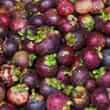Background
- Garcinia (Garcinia cambogia) is a diminutive purple fruit native to India and Southeast Asia. It is used as a weight loss aid, but the evidence is inconclusive. The rind is rich in hydroxycitric acid (HCA) and has been used for centuries throughout Southeast Asia as a food preservative, flavoring agent and carminative (induces expulsion of gas from stomach or intestines). According to Indian folk tradition, Garcinia cambogia is used for rheumatism and bowel complaints.
- Neither acute nor chronic toxicity is reported with regular consumption of garcinia products as either food or tonics. These products have been used routinely in the coastal areas of South Asia for centuries and they continue to be consumed in large amounts. There is preliminary evidence for the use of garcinia in exercise performance and weight loss, although current, available evidence is mixed.
References
Natural Standard developed the above evidence-based information based on a thorough systematic review of the available scientific articles. For comprehensive information about alternative and complementary therapies on the professional level, go to . Selected references are listed below.
- Asano J, Chiba K, Tada M, et al. Cytotoxic xanthones from Garcinia hanburyi. Phytochemistry 1996;41(3):815-820.
View Abstract - Gopalakrishnan G, Balaganesan B. Two novel xanthones from Garcinia mangostana. Fitoterapia 2000;71(5):607-609.
View Abstract - Heymsfield SB, Allison DB, Vasselli JR, et al. Garcinia cambogia (hydroxycitric acid) as a potential antiobesity agent: a randomized controlled trial. JAMA 1998;280(18):1596-1600.
View Abstract - Ito C, Itoigawa M, Mishina Y, et al. Cancer chemopreventive agents. New depsidones from Garcinia plants. J Nat Prod 2001;64(2):147-150.
View Abstract - Jena BS, Jayaprakasha GK, Singh RP, et al. Chemistry and biochemistry of (-)-hydroxycitric acid from Garcinia. J Agric Food Chem 2002;50(1):10-22.
View Abstract - Kriketos AD, Thompson HR, Greene H, et al. (-)-Hydroxycitric acid does not affect energy expenditure and substrate oxidation in adult males in a post-absorptive state. Int J Obes Relat Metab Disord 1999;23(8):867-873.
View Abstract - Lim K, Ryu S, Nho HS, et al. (-)-Hydroxycitric acid ingestion increases fat utilization during exercise in untrained women. J Nutr Sci Vitaminol (Tokyo) 2003;49(3):163-167.
View Abstract - Lin YM, Anderson H, Flavin MT, et al. In vitro anti-HIV activity of biflavonoids isolated from Rhus succedanea and Garcinia multiflora. J Nat Prod 1997;60(9):884-888.
View Abstract - Mackeen MM, Ali AM, Lajis NH, et al. Antimicrobial, antioxidant, antitumour-promoting and cytotoxic activities of different plant part extracts of Garcinia atroviridis griff. ex T. anders. J Ethnopharmacol 2000;72(3):395-402.
View Abstract - Mansi IA, Huang J. Rhabdomyolysis in response to weight-loss herbal medicine. Am J Med Sci 2004;327(6):356-357.
View Abstract - Mattes RD, Bormann L. Effects of (-)-hydroxycitric acid on appetitive variables. Physiol Behav 2000;71(1-2):87-94.
View Abstract - Preuss HG, Bagchi D, Bagchi M, et al. Effects of a natural extract of (-)-hydroxycitric acid (HCA-SX) and a combination of HCA-SX plus niacin-bound chromium and Gymnema sylvestre extract on weight loss. Diabetes Obes Metab 2004;6(3):171-180.
View Abstract - Roux D, Hadi HA, Thoret S, et al. Structure-activity relationship of polyisoprenyl benzophenones from Garcinia pyrifera on the tubulin/microtubule system. J Nat Prod 2000;63(8):1070-1076.
View Abstract - Soni MG, Burdock GA, Preuss HG, et al. Safety assessment of (-)-hydroxycitric acid and Super CitriMax, a novel calcium/potassium salt. Food Chem Toxicol 2004;42(9):1513-1529.
View Abstract - Thoison O, Fahy J, Dumontet V, et al. Cytotoxic prenylxanthones from Garcinia bracteata. J Nat Prod 2000;63(4):441-446.
View Abstract







